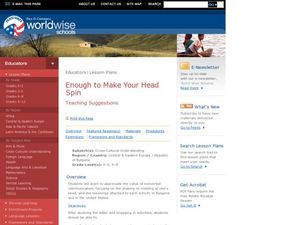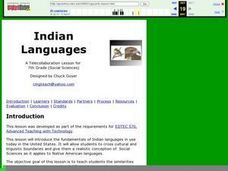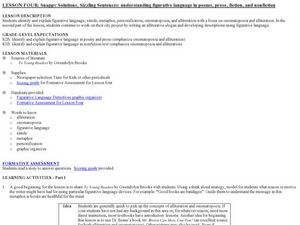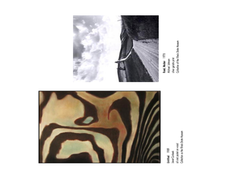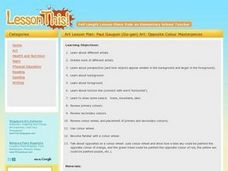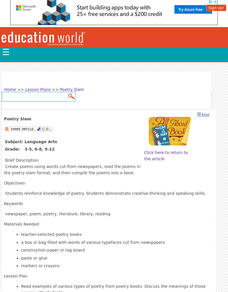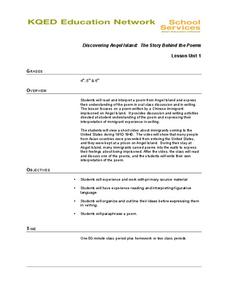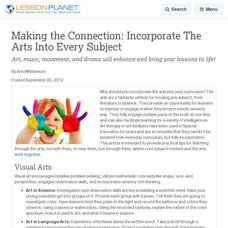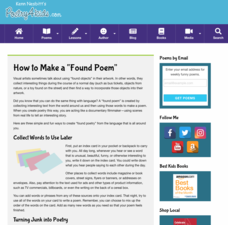Curated OER
Enough to Make Your Head Spin
Students investigate the world of nonverbal communication by analyzing body language around the world. In this cultural communication instructional activity, students research the Bulgarian language and how we could easily misinterpret...
Curated OER
A Creative Presentation
Bring writing to life with this lesson in which elementary and middle schoolers create a display of the imagery they identify in a series of Gary Paulsen books. They read the suggested materials, identify imagery and descriptive...
Curated OER
Narratives
Add to the narrative writing experience. Elementary or middle school writers listen to the teacher read a descriptive passage, then reread the same passage silently. They highlight sensory details and figurative language, then orally...
Curated OER
Indian Languages
Fifth graders explore the different types of Indian languages used today in the United States.
Curated OER
Snappy Solutions, Sizzling Sentences
An examination of the figurative language in Gwendolyn Brooks’ To Young Readers challenges your writers to think about the richness of language. Ask your class why Brooks says, “Good books are bandages.” This discussion of alliteration,...
Curated OER
Compare and Contrast Art
Practice the skill of compare and contrast. First, show learners the different pairs of artwork in the project packet (included). Then, each learner chooses one of the pairs and finds the similarities and differences between the...
Curated OER
Ripped Paper Art - Snowmen, Mountains and Evergreens
Students discover depth in photographs or paintings by creating a picture from scrap paper. In this art analysis lesson, students practice creating depth by placing different elements higher or lower on a picture. Students utilize torn...
Curated OER
Paul Gauguin Art: Opposite Colour Masterpieces
Students discover new art techniques by examining the work of Paul Gauguin and his use of opposite colors. In this art analysis instructional activity, students investigate the different perspectives and colors used in classic post...
Curated OER
"Declaration of Independence" From Plagiarism
So, what does the Declaration of Independence even mean? Learners of all ages paraphrase the Declaration of Independence in modern terms. They work as a group or class to paraphrase the language of the Declaration of Independence. There...
Curated OER
What a Character!
Guide your readers to explore character traits. As a class, discuss and record the traits of a commonly-known fairy tale character. Then do the same with the main character in the class novel. Finally, have learners use magazines and...
Curated OER
ELA Unit Planning Template Style One
Work with your department or on your own to create organized unit plans that connect to all parts of the Common Core standards. The three-page template includes space to summarize the unit, list standards for each category of the ELA...
Curated OER
Poetry Slam!
Create poems without writing! Young poets create poems using words cut from newspapers, read their poems aloud, and compile them in a book. This lesson allows the teacher to view each learner's creative process and assess their current...
Curated OER
Collage to Writing
Practice expository and creative writing with your class. Pupils use magazines to find pictures, cut them out, and create a collage. This work of art is then used as a writing prompt. They describe the collage in either a creative or...
Curated OER
Discovering Angel Island: The Story Behind the Poems
Poems carved into the wooden walls of the Asian immigrant prisons on Angel Island provide upper elementary graders an opportunity to study not only the story behind the poems but to also focus on the figurative language employed by the...
Curated OER
Making the Connection: Incorporate The Arts Into Every Subject
Art, music, movement, and drama will enhance and bring your lessons to life!
Urban Education Exchange
Lessons and Units: The Watsons go to Birmingham—1963 5TH GRADE UNIT
Get ready to read The Watsons Go to Birmingham - 1963 with a lesson about historical fiction. Spanning several centuries, the resource prompts learners to guess the historical era of a story based on a word or phrase in the text. In...
Curated OER
A Fair Trade
Learners examine a piece of art to find objects and symbols used by the artist. In this visual art lesson, students look at Jaun Quick-to-See Smith's, "Trade Canoe for Don Quixote." They look for symbols and items that show the artists...
Denver Art Museum
Alien Beauty
"Beauty is in the eye of the beholder," is a popular phrase in our society. The lesson plan here puts the phrase to the test as pupils explore what truly is beautiful through a study of some Japanese folk art. A careful examination of...
Curated OER
A Way with Words or Say What?
Students explore the language of Shakespeare. In this literature lesson, students examine words invented by Shakespeare as they interpret their meanings in drawings. Students pantomime the meanings and then write a short story...
Curated OER
Making Objects Human
Explore poetry, personification, and multiple languages with a poetry reading and writing activity. After the teacher reads the poem to the class, a discussion about personification follows. The class then writes a collaborative poem...
Denver Art Museum
Descriptive Haiku
Even though this is technically an art lesson, haiku poetry is actually the main focus! Learners view photographs of Japanese tea caddies. They list five descriptive words for the caddies, then write haiku poems using the caddies as...
Teach-nology
Author’s Purpose: Inform
Why does an author write an informative article? Learners examine passages of a short reading on Spain and determine what the author wanted to inform the reader about.
National External Diploma Program Council
Capitalization Review
Using correct grammar is a capital idea! Elementary readers review the rules of capitalization, including proper nouns, abbreviations of organizations, and holidays, before correcting the errors in two sets of sentences.
Poetry4kids
How to Create a “Found Poem”
Writers compose an original found poem by searching for words that inspire them. Words are taken from everyday conversation, books, cut from magazines, the mail, or an already written poem.
Other popular searches
- 5th Grade Language Arts
- 3rd Grade Language Arts
- 4th Grade Language Arts
- Second Grade Language Arts
- English Language Arts
- 1st Grade Language Arts
- Kindergarten Language Arts
- Language Arts Jeopardy Game
- First Grade Language Arts
- Language Arts School Projects
- Language Arts Lesson Plans
- Language Arts Games


